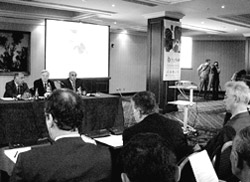The international conference dedicated to “Ecological nutrition and ecological agriculture in Armenia” was held in Yerevan on November 17-18, 2005. Soon, the Armenian legislation will include another law-the law about ecological agriculture. Ecological cultivation may become the most important aim in Armenian agriculture.
As a result of privatizing land, we have come up with 338 thousand agricultures. The average land for economy is 1.4 hectares. According to Minister of Agriculture of Armenia David Lokyan, due to the fact that Armenia does not have many lands for agriculture and can not compete against neighboring countries with agricultural product, “we must develop scientific research and keep agricultural products free of chemical substances.”
In any case, villagers don’t use pest-killers and artificial fertilizers simply because they don’t have the money for them. In addition to that, the cultivated plants in the villages located in the mountains and the plateaus may contain illnesses. “We were not using fertilizers and were not even selling the crop. Our territory is small and the market price was not what we wanted it to be. Now we are seven in number and are involved in agriculture. We use composts. We sent our product to the market for the first time this year and got some profit,” says Emma Hakobyan from the Gandzakar village in Ijevan.
The village of Gandzakar is 1200 meters above sea level. Here, the villagers grow beans, peppers, tomatoes, cucumbers, mainly local kinds due to the fact that the foreign products have a hard time adjusting to the climate. The villagers use the leaves of different biological remainders, composts made from wood, animal and plant remainders as fertilizers. “There is no stronger fertilizer,” says Emma. They fight against pests with natural resources, for example, by planting onions or flowers in the cultivating land. There are many infusions and solutions for fighting against chemical substances and they are used for ecological agriculture around the world. “We don’t have those substances in Armenia, but we are promised to receive them next year,” says Emma. The person who has made the promise is Armine Tukhikyan, who is the owner of the technical department of the “Shen” NGO which was founded in 1988 with the purpose of developing village communities. In 2002, the NGO made a try for developing ecological agriculture in Armenia. The NGO rented storage lands in the Baghramyan and Talin regions and suggested the villagers to try them out without endangering their work. Today, those two fruitful lands are in the stage of certification and are under the supervision of the “EcoGlob” organization.
The Yerevan branch of the “EcoGlob” organization is involved in certifying ecological and agricultural products. Resident of Gandzakar village Emma Hakobyan has also checked out the form. “I will check and see what their requirements are. Let’s see if we can move on with those standards; we will fill out the form and send it to the organization,” says Emma. “Shen” has been paying the expenses for certification for three years. Certification is not a one step process-the organization will keep on being checked in order to see that the ecological and agricultural products correspond to the requirements.
“Today, the potential consumers of ecological, agricultural products are foreigners living in Armenia which know what those products are,” says owner of the technical department of “Shen” NGO. There is a difficulty in consuming the ecological products in other CIS countries, besides Armenia. This is due to the fact that society is not informed and the product is more expensive in those countries.
Another problem is that the villagers underestimate this field of agriculture. “We want to encourage the villagers, but at the same time, we don’t want to instill too much hope,” says Tukhikyan. The NGO was able to find a 25 member group of farmers from Vardenis, Sisyan, Armavir and Tavush. “Shen” NGO offered them to work on their own lands and produce ecological, agricultural products. “They were the first to try it out,” says Tukhikyan. “Some of those farmers are now ready to enter the certification stage and “Shen” will compensate the expenses by encouragement.” In Tukhikyan’s words, another 20 farmers are ready to enter the field of ecological agriculture.
There are not only good conditions in Armenia for ecological agriculture but also obstacles-the small lands for agriculture in Armenia and the lack in corporations of farmers, the poor conditions of roads, poor or no telecommunication at all.

